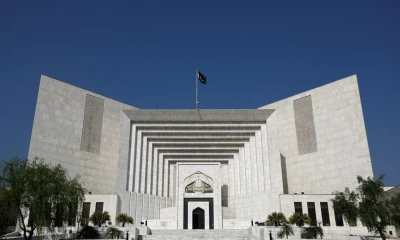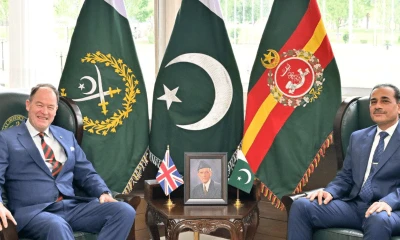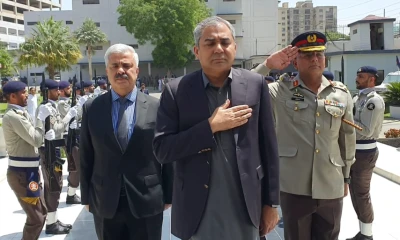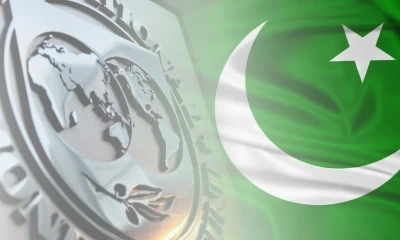-


IG Punjab Big Announcement | Breaking News | GNN
-


CM KP Ali Amin Gandapur Got Big Relief | Breaking News From Court | GNN
-


پی ٹی آئی میں خوشی کا سماں #gnn #pti #aliamingandapur #court #news #breaking #latest #video
-


عمران خان مذاکرات کے لیے تیار؟ #gnn #imrankhan #pti #jail #news #breaking #latest #video
World
China’s Chang’e-6 lunar probe ready for launch after final rehearsal
The Chang’e-6 lunar probe and Long March-5 Y8 carrier rocket were transferred to the Wenchang Spacecraft Launch Site in the southern province of Hainan last week, CGTN reports.

Beijing: China’s Chang’e-6 lunar probe is ready to be launched after it completed a final pre-launch rehearsal on Wednesday.
The Chang’e-6 lunar probe and Long March-5 Y8 carrier rocket were transferred to the Wenchang Spacecraft Launch Site in the southern province of Hainan last week, CGTN reported.
Functional checks, joint test work, and propellant filling will be carried out before the launch.
After the lunar probe and carrier rocket arrived at the launch site in January and March, respectively, the assembly, testing, and other preparations were successfully completed.
The probe is set to collect samples from the far side of the moon in a mission that will be the first of its kind in human history.
The Chang’e-7 is scheduled to be launched around 2026, and Chang’e-8 around 2028.
Chang’e-7 and Chang’e-8 will form the basic model for a lunar research station to carry out further exploration of the lunar environment, according to CNSA.
World
UN rights chief ‘troubled’ by tough police action against pro-Palestinian protesters at US universities
In recent days, demonstrations unfolding through tented encampments on school grounds – sparked by students at New York’s prestigious Columbia University who are demanding authorities divest from Israel due to its occupation and military assault on Gaza – have spread nationwide.

New York: The UN human rights chief has said he was “troubled” by heavy-handed actions taken by US security forces during attempts to break up pro-Palestinian protests on U.S. college campuses across the country.
“I am concerned that some of law enforcement actions across a series of universities appear disproportionate in their impacts,” Volker Turk said in a press statement in which he made reference to sweeping arrests and sanctions of students.
In recent days, demonstrations unfolding through tented encampments on school grounds – sparked by students at New York’s prestigious Columbia University who are demanding authorities divest from Israel due to its occupation and military assault on Gaza – have spread nationwide.
University authorities from the west to east coast have taken different approaches, ranging from Columbia’s initial response to authorize police to clear protests by force to continuing negotiations and allowing the encampments to remain. Columbia’s protesters ignored an ultimatum from the university to leave the camp or risk suspension on Monday.
Early on Tuesday morning, students took over historic Hamilton Hall on campus, barricading themselves inside. The building was one of those occupied in civil rights and Vietnam war protests by students in 1968. The university president announced earlier on Monday that dialogue with protesters had failed, and the institution would not bow to demands to divest from Israel.
In his statement on Tuesday, UN rights chief Volker Turk said that freedom of expression and the right to peaceful assembly were “fundamental to society”, particularly when there is sharp disagreement on major issues as there is in relation to the conflict in the Occupied Palestinian Territory and Israel. He noted that in recent weeks, thousands of university students in the US have been protesting the war, and many demonstrations have taken place without incident. But, there have also been hundreds of arrests following interventions on some campuses by security forces.
Many have subsequently been released while others still face charges or academic sanctions.
Action taken by authorities and law enforcement officials to restrict such expression needs to be carefully scrutinized to ensure they do not go beyond what is demonstrably necessary to protect the rights and freedoms of others or for another legitimate aim, such as the maintenance of public health or order, Turk said.
The rights chief emphasized that any clearly anti-Semitic conduct and speech was totally unacceptable and deeply disturbing. Anti-Arab and anti-Palestinian conduct and speech are equally reprehensible, he said. “Incitement to violence or hatred on grounds of identity or viewpoints – whether real or assumed – must be strongly repudiated,” he continued. “We have already seen such dangerous rhetoric can quickly lead to real violence.”
He said any violent conduct should be addressed on a case-by-case basis rather than through sweeping measures “that impute to all members of a protest the unacceptable viewpoints of a few”.
“Here, as elsewhere, responses by universities and law enforcement need to be guided by human rights law, allowing vibrant debate and protecting safe spaces for all.”
The High Commissioner emphasized that any restrictions to fundamental freedoms of expression must be guided by “legality, necessity and proportionality” and applied without discrimination.
“US universities have a strong, historic tradition of student activism, strident debate and freedom of expression and peaceful assembly,” Turk added.
Pakistan
SC moved against judges’ appointment process, asked for proper mechanism
Advocate Akmal Khan asks the Supreme Court to ensure transparent and on merit process and procedure for appointment of the judges in high courts as well as the apex court.

Islamabad: A constitutional writ petition has been moved to the Supreme Court of Pakistan seeking transparency and proper mechanism for appointment of judges in the superior judiciary.
Akmal Khan, a lawyer who has mentioned himself as a whistle blower in the plea, has challenged the existing ways of appointments of judges in the high courts as well as the Supreme Court of Pakistan.
The plea comes to the apex court at such a moment when the issue of the security, privacy of the judges of the superior judiciary has come to the limelight, and many voices have emerged on the conventional and the social media about iappointment process of the judges.
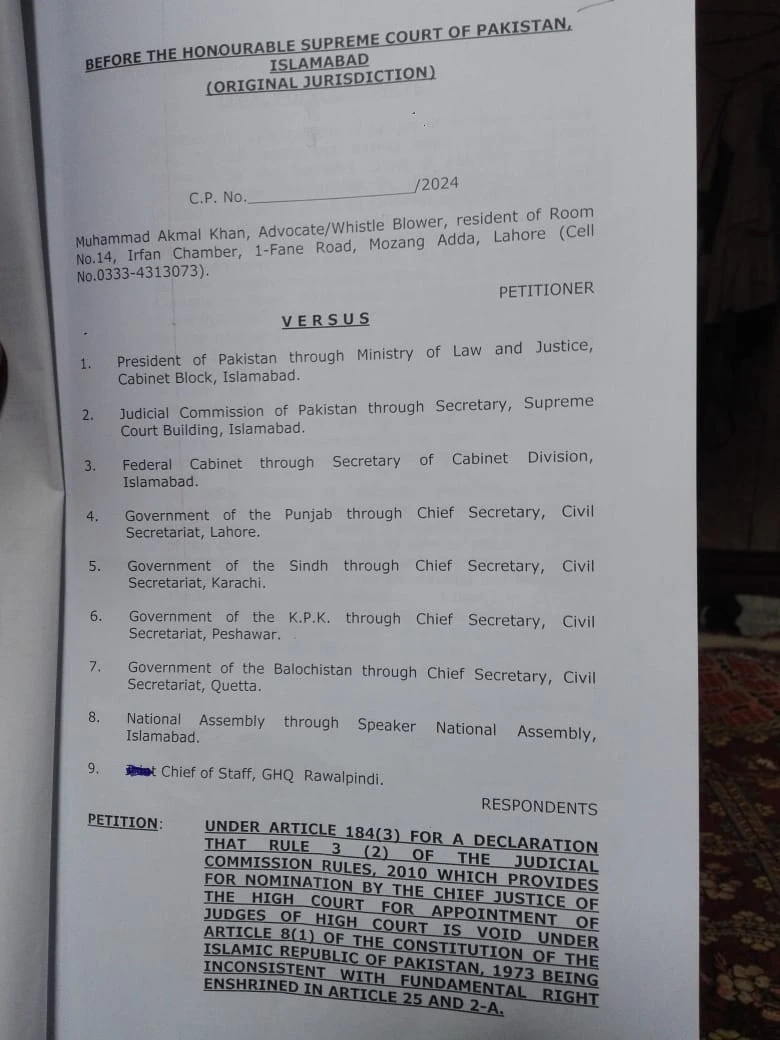
The lawyer has informed the top court that hundreds of eligible advocates are being ignored for appointment as judges in the top judiciary and nor they are being considered in this regard.
Akmal Khan also submitted that former Chief Justice of Pakistan Iftikhar Muhammad Chaudhary made Parliamentary Commission inept by virtue of rendition of judges regarding appointment of the judges including Justice Yawar Ali Khan, Justice Mamoon Rasheed Sheikh, Mazahar Ali Akbar Naqvi and Justice Farrukh Irfan Khan and etc.
Khan argued that Article 175-A of the Constitution was introduced through 18th Amendment enacting that in future the appointments would be made through an independent Commission overseen by a Committee of the parliamentarians.
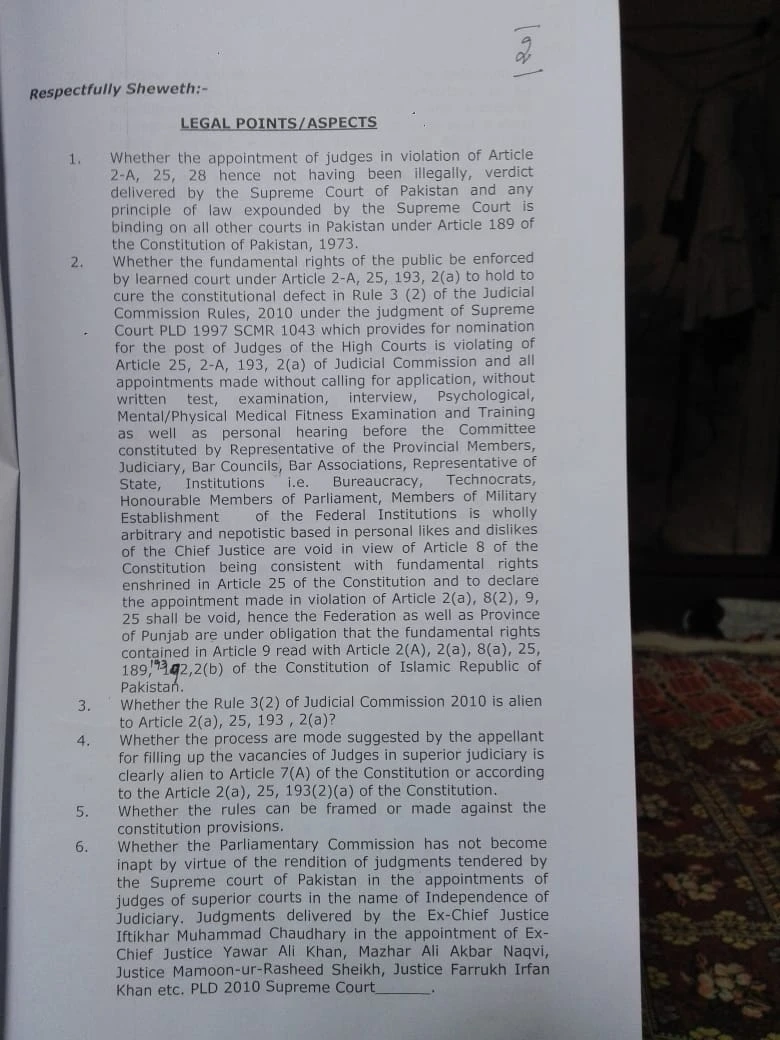
He argued that the Judicial Commission was empowered to make rules regulating the procedure. Nevertheless, Akmal Khan contended, the Rule 3(2) of the said Rules is ultra vires of Article 25. The future of thousands of advocates has turned dark due to the existing procedure of the appointment of the judges.
The petitioner submitted that nominations are always and never on merits unless the persons nominated are selected from amongst a large number of candidates invited through advertisement in the newspapers and are subjected to written examination and Interviews.
“There can be no merit if all eligible persons are not invited to compete. Merit arises out of competition,” said Advocate Khan.
He pointed out that nomination is personal as the chief justices nominate people according to their personal likes and dislikes.
He questioned that “rough and ready choice without any system of selection is not only unethical but also illegal,”.
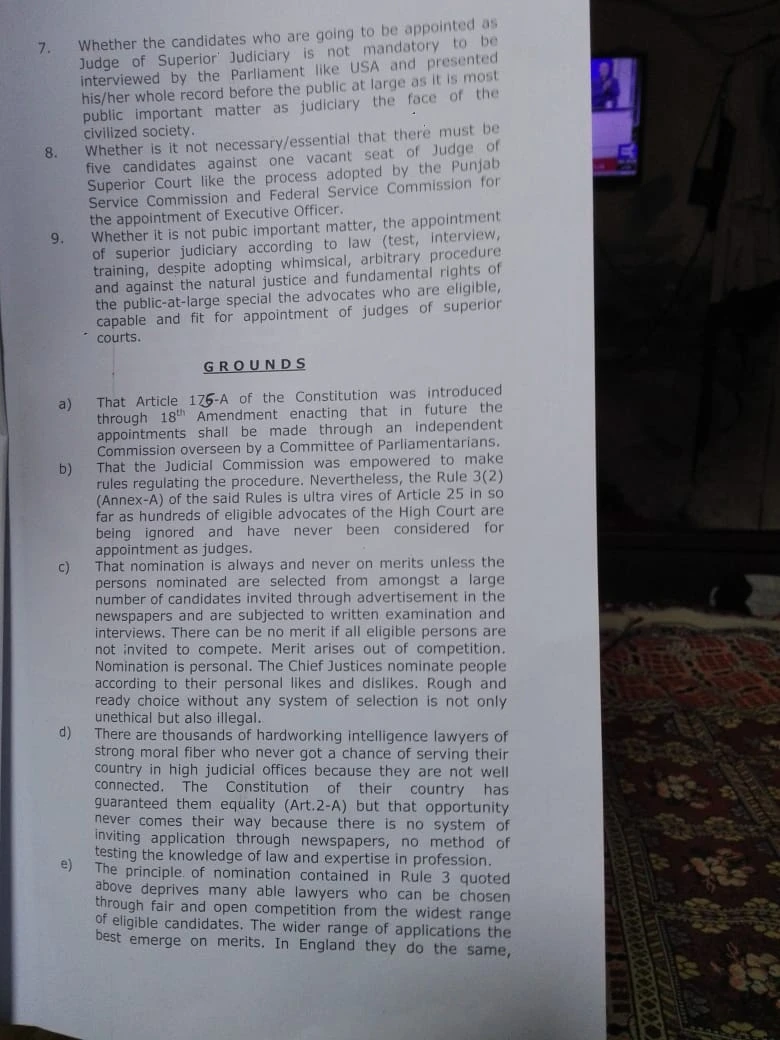
The petitioner also brought it to the light that there are thousands of hardworking intelligence lawyers of strong moral fiber who never got a chance of serving their country in high judicial offices because they are not well connected. The Constitution of their country has guaranteed them equality (Art.2-A) but that opportunity never comes their way because there is no system of inviting application through newspapers, no method of testing the knowledge of law and expertise in profession.
The lawyer submitted that the principle of nomination contained in Rule 3 quoted above deprives many able lawyers who can be chosen through fair and open competition from the widest range of eligible candidates. The wider range of applications the best emerge on merits. In England, Advocate Khan contended that they have set up Judicial Commission which is a Non Department Public Body (NDPB), by Act of 2005.
“The positions In the High Court of England and Wales "are advertised widely in the national press, legal publications, the professional and online,” he said.
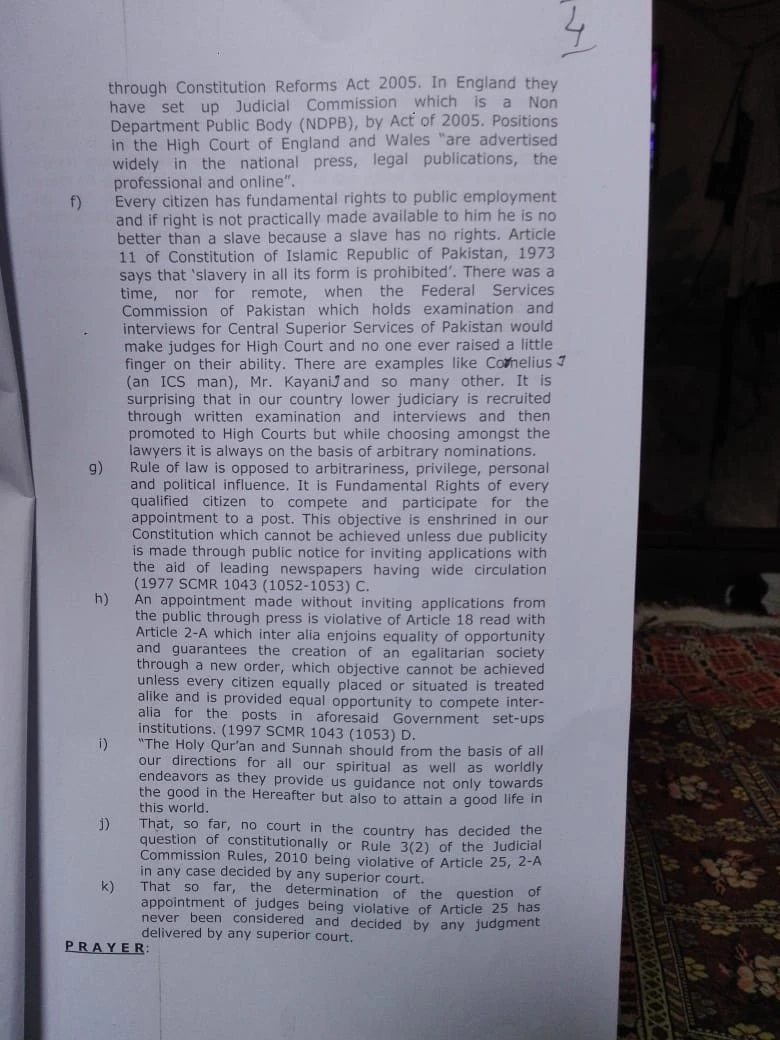
Advocate Akmal Khan also submitted that every citizen has fundamental rights to public employment and if right is not practically made available to him he is no better than a slave because a slave has no rights.
The lawyer contended that Holy Qur'an and Sunnah are main sources of directions for all the spiritual as well as worldly endeavors as they provide complete guidance not only towards the good in the Hereafter but also to attain a good life in this world.
He prayed to the Supreme Court that Rule 3(2) of the Judicial Commission Rules, 2010 which provides for nomination to the posts of Judges of the High Court is violative of Article 25, 2-A. 193 (2) (a) and all appointments made without calling for applications, without written examination and interview is wholly arbitrary and nepotistic based on personal likes and dislikes of the Chief Justices are void in view of Article 8 of the Constitution being inconsistent with Fundamental Right enshrined in Article 25 of the Constitution.
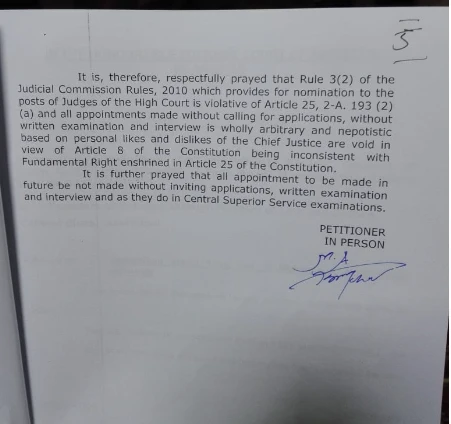
He also prayed the Supreme Court that all the appointments to be made in future be not made without inviting applications, written examination and interview and as they do in Central Superior Service examinations. The lawyer further prayed that the appointments of the judges should be stayed at this time till the disposal of this constitutional petition.
-
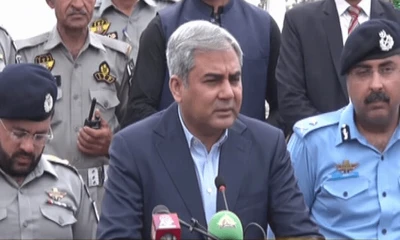
 Pakistan 2 days ago
Pakistan 2 days agoDriving license exclusively for students
-

 Pakistan 13 hours ago
Pakistan 13 hours agoZardari meets MQM leadership, discusses law and order situation in Karachi
-

 Entertainment 2 days ago
Entertainment 2 days agoWedding pictures, videos of ASP Shehrbano go viral
-
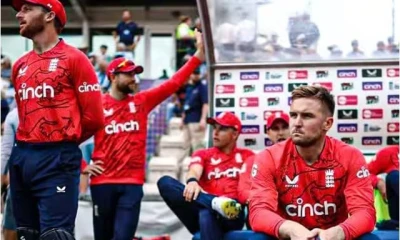
 Sports 1 day ago
Sports 1 day agoEngland announce squad for series against Pakistan
-
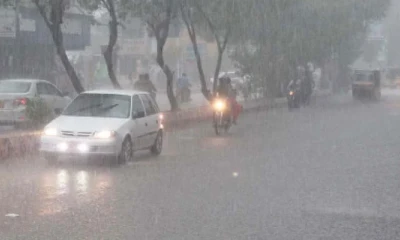
 Pakistan 2 days ago
Pakistan 2 days agoRain, hail expected in Punjab, KP today
-
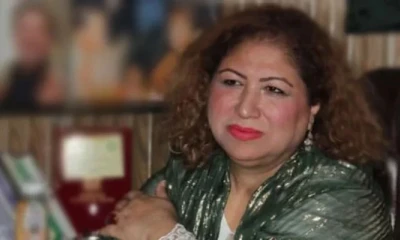
 Pakistan 11 hours ago
Pakistan 11 hours agoIPP gets another shock
-
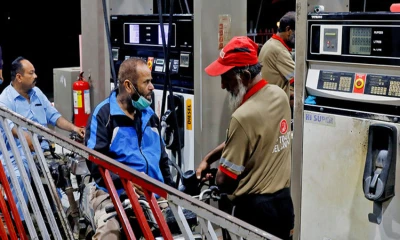
 Business 1 day ago
Business 1 day agoPetrol, diesel prices likely to drop from May 1
-
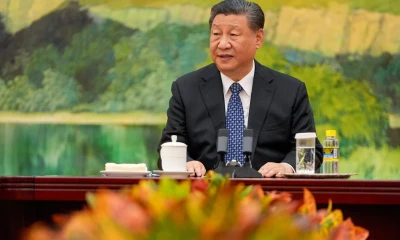
 World 2 days ago
World 2 days agoPresident Xi to visit France, Serbia, Hungary from May 5

